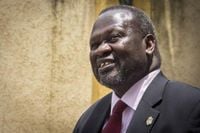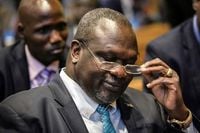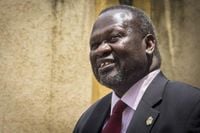On Monday, September 22, 2025, the tense political landscape of South Sudan took a dramatic turn as suspended Vice President Riek Machar appeared in a Juba courtroom, facing a litany of grave charges. The trial, broadcast live on national television, marked Machar’s first public appearance since he was placed under house arrest in March. Alongside seven co-defendants, the former rebel leader—now a central figure in South Sudan’s fragile unity government—stood accused of treason, crimes against humanity, murder, terrorism, and conspiracy, all stemming from an alleged assault on a government military base in Nasir earlier this year.
According to Reuters and state media, the government alleges that Machar orchestrated the March attack, which left more than 250 government soldiers dead and further inflamed the country’s already volatile security situation. Prosecutors also charged Machar with destruction of public property and military assets. The accusations have sent shockwaves through South Sudan’s political system, threatening to unravel a delicate peace that has held—albeit uneasily—since the end of the five-year civil war in 2018.
The trial’s opening session quickly turned contentious. Machar’s defense team challenged the legitimacy of the proceedings, arguing that the special court lacked jurisdiction to try their client. "His Excellency Dr Riek Machar should not be tried by this incompetent court, which lacks jurisdiction," Machar’s lawyer declared, echoing concerns that the prosecution violated the terms of the 2018 peace agreement signed by Machar and President Salva Kiir. That deal had ended a bloody conflict that claimed an estimated 400,000 lives and established the transitional unity government in which Machar served as first vice president—until his sudden suspension earlier this month.
"The case violates the 2018 peace deal," the defense insisted, warning that pursuing charges against Machar could destabilize the country. This isn’t an idle threat: since Machar’s suspension, government troops have clashed repeatedly with fighters loyal to him, raising fears that South Sudan could once again spiral into open warfare. The main opposition group, SPLM/SPLA-IO, responded to the charges by calling for mass mobilisation of supporters, urging protests against what they see as a politically motivated prosecution.
According to AFP, Machar’s faction flatly denies the charges, claiming they are part of President Kiir’s efforts to sideline the opposition and tighten his grip on power. A spokesperson for Machar’s camp described the trial as a "kangaroo court," arguing, "With Machar being forced to appear before a kangaroo court and imposing charges against him, (it) is a clear indication that the SPLM-IG has chosen instability over peace." The opposition maintains that Machar remains vice president under the peace agreement, and that removing him from office and prosecuting him in this manner is both illegal and dangerous.
The government’s case hinges on Machar’s alleged role in sanctioning the Nasir attack, which officials say was carried out by a loose band of fighters from Machar’s Nuer ethnic group, known locally as the White Army. The incident, which took place in Upper Nile State—one of Machar’s political strongholds—has become a flashpoint in the ongoing struggle for power between Kiir and Machar. Machar’s supporters, however, categorically deny that he ordered the assault, arguing that the charges are "politically motivated" and "legally... not justifiable" since, as civil society leader Edmund Yakani told AFP, crimes against humanity "does not exist in South Sudan's laws."
The timing of Machar’s prosecution has only added to suspicions. Earlier this month, President Kiir suspended his rival after prosecutors formally brought forward the case, a move widely interpreted as an attempt to consolidate power ahead of long-delayed national elections. Those elections, originally scheduled for December 2024, have now been postponed until 2026, as the two sides have failed to merge their armed forces—a key requirement of the peace deal. The United Nations, in a recent report, accused South Sudan’s government of stealing billions of dollars in oil revenue since independence in 2011, while providing scant resources for essential services like health and education.
The international community has watched with growing alarm as the power-sharing arrangement between Kiir and Machar has steadily eroded. Attempts to keep the peace process alive have largely failed, with both sides accusing each other of bad faith. The civil war that began in 2013, just two years after South Sudan gained independence from Sudan, left deep scars—ethnic, political, and economic—that continue to shape the country’s politics.
For many South Sudanese, the spectacle of Machar on trial is a grim reminder of the country’s recent past. The rivalry between Kiir, a Dinka, and Machar, a Nuer, has repeatedly erupted into violence, often along ethnic lines. The 2018 peace deal, which brought both men into a unity government, was supposed to mark a new chapter. But with the transitional government faltering and opposition voices being sidelined, many now fear that the country is sliding back toward the chaos of the last decade.
Machar’s supporters have responded to the charges with calls for armed mobilisation, raising the specter of renewed conflict. "The charges against him show the power-sharing agreement is dead," one opposition leader told AFP, while others have openly called for regime change. The defense has warned that the trial risks escalating tensions, particularly as government troops continue to clash with fighters loyal to Machar in several regions.
Meanwhile, civil society leaders like Edmund Yakani have expressed shock at the severity of the charges. Yakani, speaking to AFP, noted that while charges against Machar were expected, the inclusion of crimes against humanity was "shocking." He argued that such charges are "politically motivated" and lack a legal basis in South Sudanese law, suggesting that the prosecution is more about eliminating a political rival than seeking justice for the victims of violence.
As the special court adjourned the hearing until Tuesday, September 23, 2025, the future of South Sudan hangs in the balance. The outcome of Machar’s trial will likely have far-reaching implications—not just for the embattled opposition leader, but for the entire peace process and the millions of South Sudanese who have endured years of war, displacement, and hardship.
For now, the eyes of the nation—and much of the world—remain fixed on Juba, where the latest chapter in South Sudan’s long and troubled journey is being written in real time. Whether the trial will bring closure or merely open new wounds is a question that only time, and the actions of the country’s leaders, can answer.



